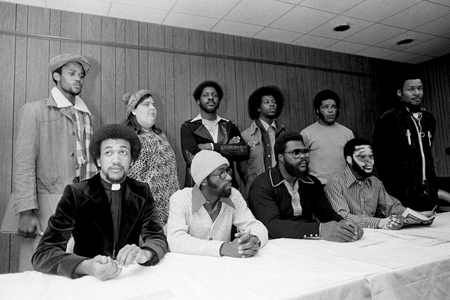
PARDONED–This Jan. 21, 1976 file photo shows the Wilmington Ten at a news conference in Raleigh, North Carolina. From left, front row, they are Chavis, William (Joe) Wright, Connie Tindall and Jerry Jacobs. In the back row are Wayne Moore, Ann Shepard, James McKoy, Willie Vereen, Marvin Patrick and Reginald Epps. (AP Photo, file)
by Cash Michaels
For New Pittsburgh Courier
RALEIGH, N.C. (NAACP) – In what civil rights leaders across the nation are calling a significant moment in the civil rights movement, North Carolina Gov. Beverly Perdue has granted individual pardons of actual innocence to all members of the Wilmington Ten.
“I have decided to grant these pardons because the more facts I have learned about the Wilmington Ten, the more appalled I have become about the manner in which their convictions were obtained,” Perdue, a Democrat who leaves office on Jan. 5, said in her Dec. 31 statement.
“Justice demands that this stain finally be removed. The process in which this case was tried was fundamentally flawed. Therefore, as Governor, I am issuing these pardons of innocence to right this longstanding wrong.”
The Wilmington Ten – nine Black males and one White female – were activists who, along with hundreds of Black students in the New Hanover County Public School System, protested rampant racial discrimination in 1971.
In February of that year, after the arrival of Rev. Benjamin Chavis to help lead the protests, racial violence erupted, with White supremacist driving through Wilmington’s Black community, fatally shooting innocent people and committing arson.
A White-owned grocery store in the Black community was firebombed, and firemen came under sniper fire. It wasn’t until a year later that Rev. Chavis and the others were rounded up and charged with conspiracy in connection with the firebombing and shootings. The 10 were falsely convicted, and sentenced to 282 years in prison, some of which they each served.
It wouldn’t be until 1977, after years of failed appeals in North Carolina courts, that the three state’s witnesses recanted their testimonies, admitting that they perjured themselves.
Amnesty International issued a blistering report declaring the Wilmington Ten “political prisoners of conscience.” The CBS News program “60 Minutes” did a one-hour expose proving that the evidence against the Wilmington Ten had been fabricated by the prosecution.
Then-Carolina Gov. James B. Hunt refused to pardon the Ten, but did commute their sentences in 1978. Two years later, the U.S. Fourth Circuit Court of Appeals overturned all of the convictions, based on gross prosecutorial misconduct and various violations of constitutional rights. The appeals court directed North Carolina to either retry the defendants, or dismiss all charges, but the state did nothing for the next 32 years.